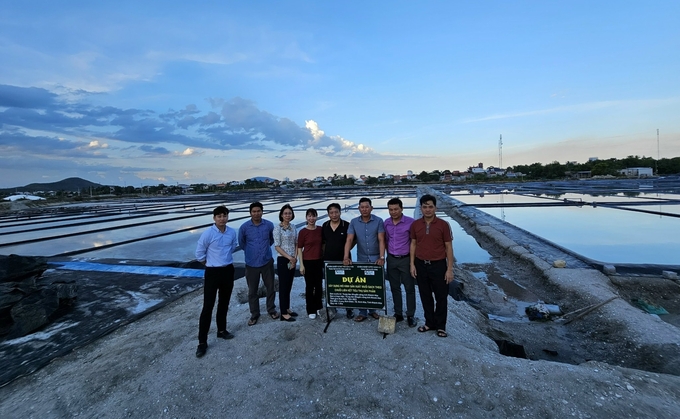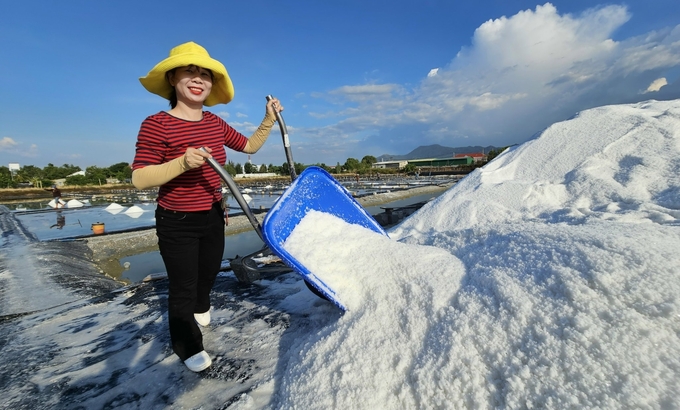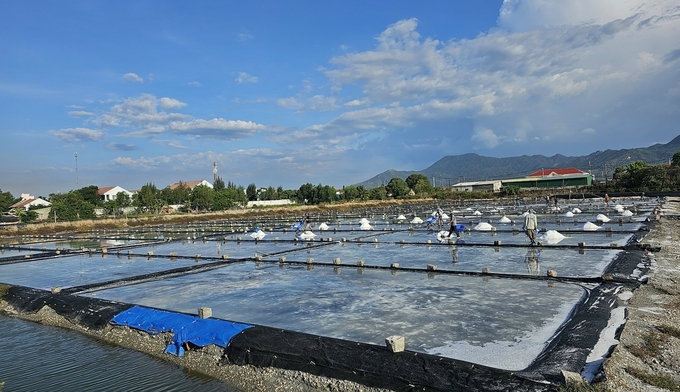June 22, 2025 | 15:51 GMT +7
June 22, 2025 | 15:51 GMT +7
Hotline: 0913.378.918
June 22, 2025 | 15:51 GMT +7
Hotline: 0913.378.918
The news reporters, along with the a delegation consisting of representatives from the Department of Science, Technology, and Environment under the Ministry of Agriculture and Rural Development; the National Agricultural Extension Center, Khanh Hoa province's Department of Agriculture and Rural Development, and Khanh Hoa Agricultural Extension Center, visited the clean salt production model on HDPE sheets in Ninh Diem Ward, Ninh Hoa Town, Khanh Hoa Province.

A clean salt production model on HDPE sheets in Ninh Diem Ward, Ninh Hoa Town, Khanh Hoa Province. Photo: Kim So.
This is one of the models under the national agricultural extension project on "Building a clean salt production model within the product consumption chain." The project is being implemented in the three provinces of Khanh Hoa, Phu Yen, and Ninh Thuan on a total area of 7 hectares. Additionally, the project has been scheduled for implementation from 2023 to 2024. The project covers an area of 2.5 hectares in Khanh Hoa province over two years, led by the Khanh Hoa province's Agricultural Extension Center.
The Khanh Hoa Agricultural Extension Center is implementing the salt production model on a 1.5-hectare area belonging to Ms. Nguyen Thi Bich Hop in 2023. Due to the bidding process, the model owner has not received support from the state budget. However, the model owner has proactively invested in HDPE plastic sheets to line an area of approximately 1,200 square meters within the salt crystallization pond.
According to Ms. Nguyen Thi Huong Thao, Deputy Head of Agricultural Extension Affairs under Khanh Hoa province's Agricultural Extension Center), the monitoring of this salt production model has shown that the average salt yield falls between roughly 4 to 5 tons per harvest. The model owner harvests salt four times on a monthly average, whereas salt harvested from traditional earthen ponds can only be harvested three times on a monthly average with a lower production rate ranging from 2 to 2.5 tons per harvest. Additionally, the use of HDPE plastic sheets to line the salt fields results in higher-quality salt with pure white grains and fewer impurities. Most notably, the selling price of the final salt product is 1.5 to 2 times higher compared to that of salt harvested from earthen ponds.

Salt production on HDPE plastic sheets provides higher yield and quality compared to traditional soil-based production methods. Photo: Kim So.
"The model has demonstrated that salt production on fields lined with HDPE plastic sheets not only results in higher yield and better salt quality but also allows for more frequent salt harvesting throughout the year compared to traditional soil-based methods," shared Ms. Thao. She further added that although HDPE plastic incurs higher initial costs, its durability can extend beyond ten years, making the depreciation cost relatively low.
Mr. Le Nhu Huy, one of the model's owner, revealed that he harvested approximately 70 tons of salt between the months of March and June 2023. Accordingly, the use of HDPE sheets on salt fields showed excellent heat absorption capabilities compared to regular sheets. "Regular sheets takes up to 9 hours to heat up before adding water under sunlight, whereas HDPE sheets only takes around 7 hours and 30 minutes to become heated, indicating that HDPE canvas facilitates faster evaporation, resulting in quicker salt crystallization," Mr. Huy explained.
According to Mr. Huy, the salt-producing region in Ninh Diem primarily used soil-based methods. Additionally, he was one of the first salt producers to adopt the HDPE sheets lining method in 2018. Consequently, the salt production yield on HDPE sheets is two to three times higher than that of soil-based production methods. Moreover, salt harvesting is significantly faster and convenient, especially in the absence of rainy weather. Namely, salt production on HDPE sheets is ready for harvest after only a few days, whereas soil-based salt production requires at least over two weeks.

The clean salt production model on HDPE sheets in Ninh Diem Ward, Ninh Hoa Town, is being implemented for the first time in Khanh Hoa Province. Photo: Kim So.
Mr. Nguyen Van Tin, Vice Chairman of Ninh Diem Ward People's Committee, reported that the ward has approximately 120 hectares of salt production area. Local cooperatives and residents have invested in salt production using sheets over the years. As a result, at least 90% of the total production area in the ward is utilizing sheets in the production process. However, there are currently no households producing salt on HDPE sheets. The implementation of the clean production model by the province's Agricultural Extension Center will help local residents access new production methods, thereby enhancing efficiency, productivity, and salt quality.
Based on the positive results from the production model, Khanh Hoa Province's Agricultural Extension Center believes that the model will be expanded to cover more than 20% of the project's scale in the near future.
The project "Building a clean salt production model within a product consumption chain" aims to establish a model that achieves a salt yield of 100 tons per hectare per crop, whereas traditional salt production on land yields only 62 tons per hectare per crop. The project will also create a product supply and consumption linkage chain, ensuring that at least 60% of the salt produced from the model is consumed. Additionally, it will organize training, workshops, field trips, and information dissemination activities to promote and expand the model.
Translated by Nguyen Hai Long
![Turning wind and rain into action: [9] Digitizing hydrometeorological data in response to climate change](https://t.ex-cdn.com/nongnghiepmoitruong.vn/608w/files/news/2025/06/17/z6704423696987_15fd32ffc26d590d204d520c9dac6786-nongnghiep-165943.jpg)
(VAN) Farmers have begun accessing hydrometeorological applications to adjust their cropping schedules, aiming to ensure productivity and adapt to climate change.
![Turning wind and rain into action: [8] Real-time salinity detection and early warning technology](https://t.ex-cdn.com/nongnghiepmoitruong.vn/608w/files/news/2025/06/17/z6704423696987_15fd32ffc26d590d204d520c9dac6786-nongnghiep-151127.jpg)
(VAN) Thanks to the integration of modern hydrological-hydraulic models, remote sensing technologies, and artificial intelligence, the accuracy of hydrological forecasting has significantly improved.
![Turning wind and rain into action: [7] Early disaster warnings help marine farmers minimize losses](https://t.ex-cdn.com/nongnghiepmoitruong.vn/608w/files/news/2025/06/17/z6704423696987_15fd32ffc26d590d204d520c9dac6786-nongnghiep-142942.jpg)
(VAN) In recent years, thanks to early disaster warnings and forecasting, marine farmers in Khanh Hoa province have been able to reduce risks and losses, thereby improving production efficiency.
![Turning wind and rain into action: [6] ‘Four on-the-spot’ disaster management software](https://t.ex-cdn.com/nongnghiepmoitruong.vn/608w/files/news/2025/06/17/e5a48259d6a262fc3bb3-nongnghiep-183800.jpg)
(VAN) By simply activating the scenario on the disaster management software, the relevant authorities immediately know how many households need to be evacuated, where to evacuate them to, and by what means of transportation…
![Turning wind and rain into action: [5] Hue applies modern technology in disaster forecasting](https://t.ex-cdn.com/nongnghiepmoitruong.vn/608w/files/news/2025/06/17/z6704423696987_15fd32ffc26d590d204d520c9dac6786-nongnghiep-093938.jpg)
(VAN) In Hue city, modern technology has recently been applied in meteorological and hydrological forecasting and warning, helping to reduce the damage caused by natural disasters.

(VAN) A cutting-edge farming technique being implemented on an experimental ranch in Arizona's Sonoran Desert has already saved a billion gallons of water over five years, according to Civil Eats.

(VAN) Poultry and pig production and the environment can be boosted through enhanced water technology, according to new research.